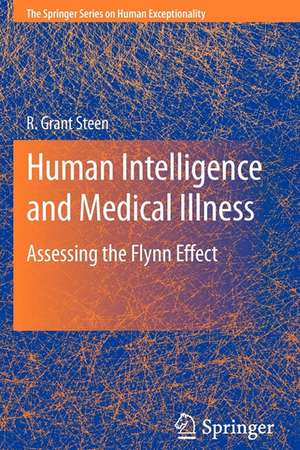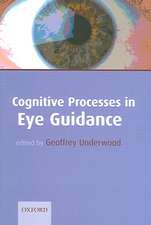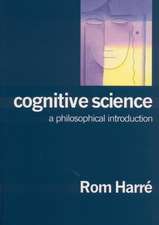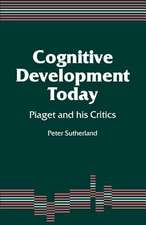Human Intelligence and Medical Illness: Assessing the Flynn Effect: The Springer Series on Human Exceptionality
Autor R. Grant Steenen Limba Engleză Paperback – noi 2010
| Toate formatele și edițiile | Preț | Express |
|---|---|---|
| Paperback (1) | 384.48 lei 6-8 săpt. | |
| Springer – noi 2010 | 384.48 lei 6-8 săpt. | |
| Hardback (1) | 643.48 lei 6-8 săpt. | |
| Springer – 8 oct 2009 | 643.48 lei 6-8 săpt. |
Din seria The Springer Series on Human Exceptionality
- 18%
 Preț: 1013.96 lei
Preț: 1013.96 lei - 15%
 Preț: 645.14 lei
Preț: 645.14 lei - 18%
 Preț: 976.54 lei
Preț: 976.54 lei - 5%
 Preț: 718.10 lei
Preț: 718.10 lei - 15%
 Preț: 645.79 lei
Preț: 645.79 lei - 5%
 Preț: 608.75 lei
Preț: 608.75 lei - 18%
 Preț: 954.62 lei
Preț: 954.62 lei -
 Preț: 390.46 lei
Preț: 390.46 lei - 18%
 Preț: 998.79 lei
Preț: 998.79 lei -
 Preț: 386.99 lei
Preț: 386.99 lei - 18%
 Preț: 900.29 lei
Preț: 900.29 lei - 20%
 Preț: 552.12 lei
Preț: 552.12 lei - 15%
 Preț: 533.72 lei
Preț: 533.72 lei - 18%
 Preț: 1404.15 lei
Preț: 1404.15 lei - 18%
 Preț: 1115.63 lei
Preț: 1115.63 lei - 15%
 Preț: 643.48 lei
Preț: 643.48 lei - 18%
 Preț: 1123.04 lei
Preț: 1123.04 lei
Preț: 384.48 lei
Nou
Puncte Express: 577
Preț estimativ în valută:
73.57€ • 77.02$ • 60.87£
73.57€ • 77.02$ • 60.87£
Carte tipărită la comandă
Livrare economică 05-19 aprilie
Preluare comenzi: 021 569.72.76
Specificații
ISBN-13: 9781441981332
ISBN-10: 1441981330
Pagini: 232
Ilustrații: XII, 218 p.
Dimensiuni: 155 x 235 x 12 mm
Greutate: 0.33 kg
Ediția:2009
Editura: Springer
Colecția Springer
Seria The Springer Series on Human Exceptionality
Locul publicării:New York, NY, United States
ISBN-10: 1441981330
Pagini: 232
Ilustrații: XII, 218 p.
Dimensiuni: 155 x 235 x 12 mm
Greutate: 0.33 kg
Ediția:2009
Editura: Springer
Colecția Springer
Seria The Springer Series on Human Exceptionality
Locul publicării:New York, NY, United States
Public țintă
Professional/practitionerCuprins
Are People Getting Smarter?.- Human IQ and Increasing Intelligence.- Evolution and Increasing Intelligence.- Brain Development and Increasing Intelligence.- Environment and Increasing Intelligence.- Evidence of Physical Plasticity in Humans.- Evidence of Mental Plasticity in Humans.- Evidence of Cognitive Plasticity in Humans.- Impact of Medical Conditions on Human IQ in the United States.- Impact of Medical Conditions on Human IQ Worldwide.- Medical Interventions for Cognitive Impairment.- Increasing IQ in the United States.- Increasing IQ and Social Justice.
Recenzii
From the reviews:“The 218-page volume is divided into 13 chapters on topics … in human intelligence. … Human Intelligence and Medical Illness should be commended for taking an evidence-based approach to the topic of intelligence … . The book is concise, timely, and generally well written. … Overall, Human Intelligence and Medical Illness is a thought-provoking book that is well worth reading. If you are interested in how to improve human intelligence, then this book is for you.” (Richard E. Mayer, PsycCRITIQUES, Vol. 55 (4), January, 2010)“This book explores the nature of IQ testing, changes that have occurred, and conditions that can impact it. … to provide readers with comprehensive information about intelligence testing, trends, and current literature. … Clinical and school psychologists would find this book interesting, but others working in developmental fields also would find it of use. … This is a superficial review of the intellectual issues presented.” (Christopher J. Graver, Doody’s Review Service, April, 2010)
Notă biografică
R. Grant Steen has written 5 books and 70 research articles, mostly about the human brain in health and disease. He has been a professor of psychiatry, pediatrics, biomedical engineering, and radiology (brain imaging), and he worked for 20 years in clinical research at various medical schools and hospitals. He earned a Doctorate in Biology from UCLA, held a National Research Service Award at the Johns Hopkins University School of Medicine, and he has been a faculty member at the University of Washington, St. Jude Children's Research Hospital, the University of Tennessee, and the University of North Carolina. Dr. Steen now consults and writes about the brain full-time.
Textul de pe ultima copertă
There’s little doubt that people are growing smarter. This effect is so strong that IQ tests must be renormed periodically to prevent classifying an overabundance of people as geniuses. The question is why is this collective rise in IQ – known as the Flynn effect –occurring? Possible theories to explain the Flynn effect have ranged from better parenting to faster evolution.
Bringing a bold new voice to the debate, Human Intelligence and Medical Illness sets out a simple definition of intelligence that is appropriate for assessing intelligence at the population level. The definition is then used to probe the relationship between population intelligence and public health. This volume uses the latest medical and behavioral science research to argue that declines in serious disease and illness-causing conditions (e.g., lead paint in buildings) correlate strongly with continued cognitive gains in both developed and developing countries. Current political realities explain why the Flynn effect should be approached as a public policy as well as a public health issue.
This provocative volume:
Bringing a bold new voice to the debate, Human Intelligence and Medical Illness sets out a simple definition of intelligence that is appropriate for assessing intelligence at the population level. The definition is then used to probe the relationship between population intelligence and public health. This volume uses the latest medical and behavioral science research to argue that declines in serious disease and illness-causing conditions (e.g., lead paint in buildings) correlate strongly with continued cognitive gains in both developed and developing countries. Current political realities explain why the Flynn effect should be approached as a public policy as well as a public health issue.
This provocative volume:
- Reviews the most widely held hypotheses accounting for the Flynn effect.
- Examines the relationship between intelligence and public health.
- Assesses the extent to which public health improvements can potentially account for the Flynn effect.
- Details how treatment of common medical problems may result in a substantial rise in IQ.
- Explores the possibility of continued IQ gains in the United States and worldwide.
- Reframes the Flynn effect in the contexts of public health, early childhood education, and social justice.
Caracteristici
Examines the global links between the rise in IQ – known as the Flynn Effect – and general human health Assesses whether public health improvements potentially account for the Flynn Effect Details how treatment of common medical problems may result in a substantial IQ rise Explores whether additional and substantial IQ gains are possible in the U.S. and the world Includes supplementary material: sn.pub/extras

















